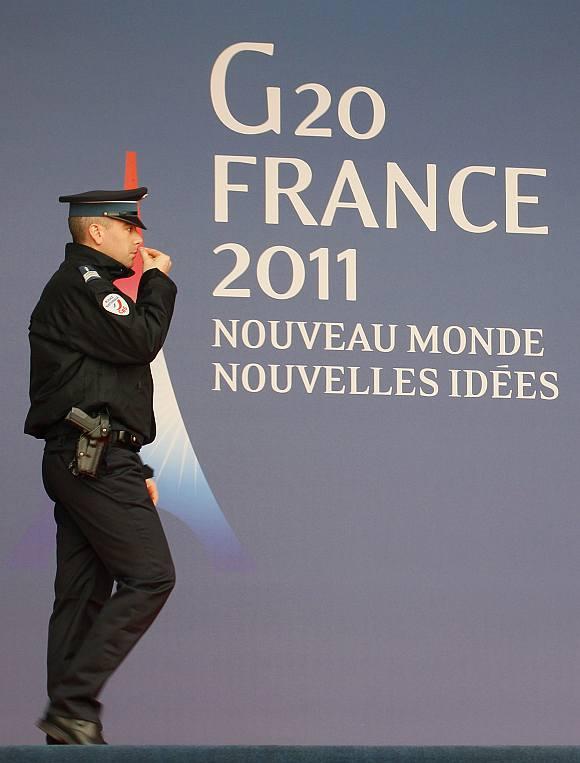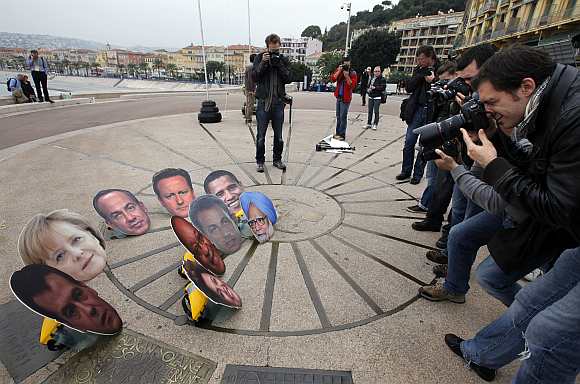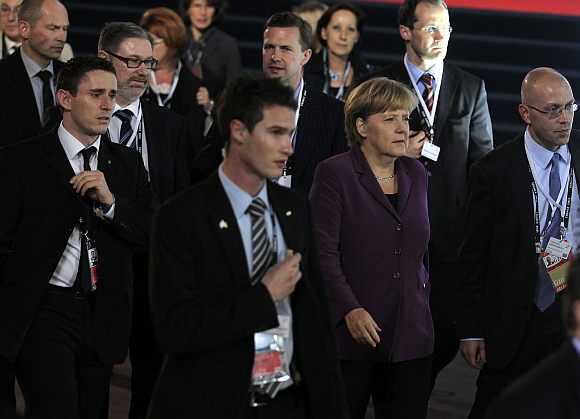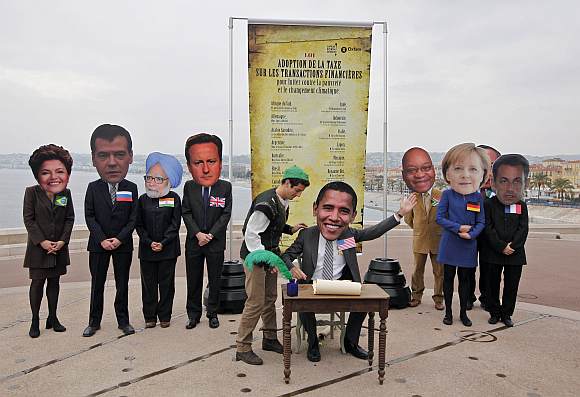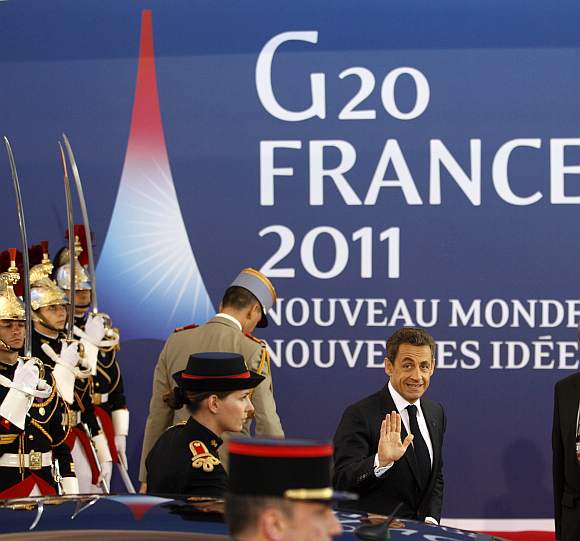 | « Back to article | Print this article |
India at G20: Will big economies be able to deliver the goods?
Even as Prime Minister Manmohan Singh arrived in the quaint, quiet resort of Cannes in southern France on Wednesday for the G20 Summit, the air was thick with doubt if the leaders of the world's largest economies would be able to deliver the goods and rein in the galloping debt crisis. Shishir Bhate reports from Cannes.
The hottest topic till two days ago was the hurriedly designed Eurozone debt bailout plan: it breathed new life into global markets, it brought a modicum of hope to the floundering economies, and it looked like the world, after having stumbled, might move on to the path of economic recovery.
Then Greece -- which would have benefited from the bailout given that its lenders were to take a 50 per cent 'haircut' -- poured ice cold water on to the works with its declaration to hold a public ballot (referendum) on the plan, sending markets and the global economy into a tizzy.
Now unless the G20 thinks out of the box and overcomes the biggest debt crisis that Eurozone has ever seen, it could have potentially terminal consequences for the entire world, especially the developing nations who cannot remain unaffected if this economic maelstrom envelops Europe.
But hopes seem to be fizzling out. And even expectations are dropping as a possible answer to this problem remains elusive.
So much so that the relevance of G20 in today's scary scenario has been questioned by some. "And that is the biggest test for G20 today," an Indian government source said on Wednesday.
Click NEXT to read further...
So who will bail whom out?
In November 2008 at the first G20 Summit in Washington, there was convergence of ideas on the economic challenges facing the world.
The process moved forward at the London G20 Summit in April 2009 and only a few weeks after the 3rd G20 Summit at Pittsburgh in September 2009, huge bailout packages had been announced to help the United States and other nations get over the economic crisis.
However, the developed nations have not only failed to recover from the crisis, they are also in danger of slipping into an even bigger fiscal mess this time around.
So who will bail whom out? China is a likely candidate given its gargantuan financial muscle, but what will it ask for in return? Apart from high technology transfer, there is not much that Europe can offer China or whoever else bails it out.
There was some buzz also about the BRICS nations -- India, Brazil, Russia and South Africa, along with China -- offering help to the beleaguered European Union. But that might be a bit difficult now.
Click NEXT to read further...
'G-20 is all about money, and power'
India itself is hobbled by tricky problems: a large fiscal deficit, a high rate of inflation, skyrocketing commodity prices, breathtaking corruption, and a slowing economy.
In this backdrop, offering a stimulus package would neither make good economic nor astute political sense.
As a government source had said in Delhi earlier in the day, "G20 is not just an economic matter, but also has strategic and political significance. It is all about money, and power..."
Yet, with the shift in global power towards the East, the degree of influence that India commands today is not a matter to mock at.
"The world today wants to hear what its economist-turned-prime minister has to say. India has never been so inter-connected with global powers, and considering that it can not only contribute to global growth but also offer a viable solution to the Eurozone debt crisis, it does have a say at the global high table," said a government source. "Not a dominant say, but a say nonetheless."
The buoyant mood -- that the world leaders momentarily experienced upon the creation of the now-implausible Eurozone debt bailout plan -- might continue to elude them if the G20 leaders are unable to adopt a proposal that could tame the escalating debt crisis, for this could be the game-changer for developed and the developing world.
Click NEXT to read further...
India would like the Eurozone to prosper: Manmohan
In all likelihood, however, India will be supportive of any reasonable multilateral effort to provide Europe with the support needed to stabilise. But New Delhi could insist on putting in place mechanisms for fiscal discipline.
India might also emphasise that the world should pay more attention to the development interests of poorer countries to increase their representation in international economic institutions and to reduce the risks arising from the global market, especially the volatility of commodity prices.
Before leaving for Cannes, Prime Minister Manmohan Singh had said in a statement that the Eurozone is a historic project.
"India would like the Eurozone to prosper, because in Europe's prosperity lies our own prosperity. It is important for the Cannes Summit to signal a strong and coordinated approach to put the global economy back on track, while addressing medium term structural issues."
"Developing economies such as India need a conducive global economic environment to address the vast challenges they face. In an increasingly interdependent world, we have to be wary of contagion effects and the import of inflationary pressures in our economy. We need to ensure that developing countries have access to requisite funds through multilateral development banks and to investible surpluses to meet their infrastructure and other priority needs," he said.
Click NEXT to read further...
'It is imperative that difficult decisions are taken swiftly'
The prime minister said that the Cannes Summit takes place against the backdrop of the Eurozone sovereign debt crisis which has emerged as the principal source of concern for the global economy.
"The twin summits of the European Union and Eurozone a few days ago have helped to restore a measure of confidence in the markets, but much more needs to be done. It is imperative that the difficult decisions needed to address the economic challenges in Europe and elsewhere are taken swiftly," he said.
He also touched upon the issue of global governance as it is an issue of importance for India. He said, ". . . we will work with others to develop effective and representative global governance mechanisms and carry forward the process of reform of the international monetary and financial system."
The prime minister will hold bilateral meetings with French President Nicolas Sarkozy and British Prime Minister David Cameron.
He will also meet Australian Prime Minister Julia Gillard, European Council president Herman Van Rompuy and European Commission president Jose Manuel Barroso during his stay in Cannes.
